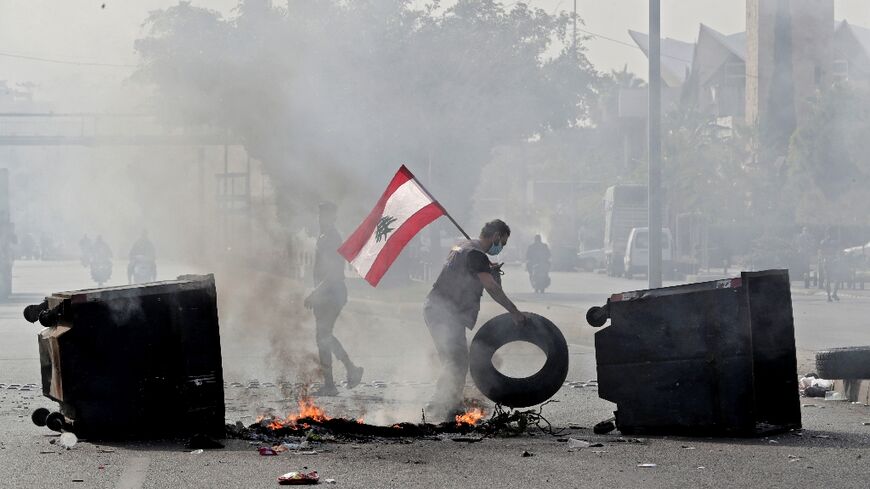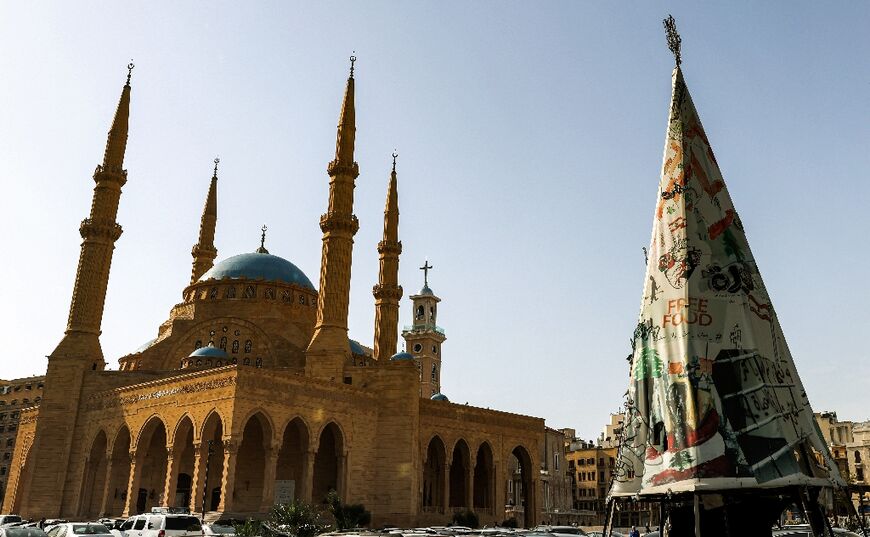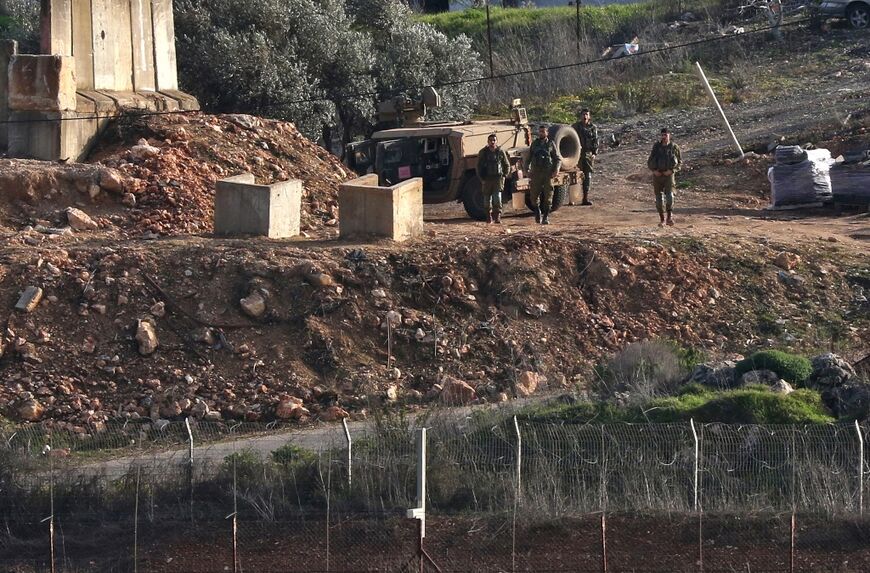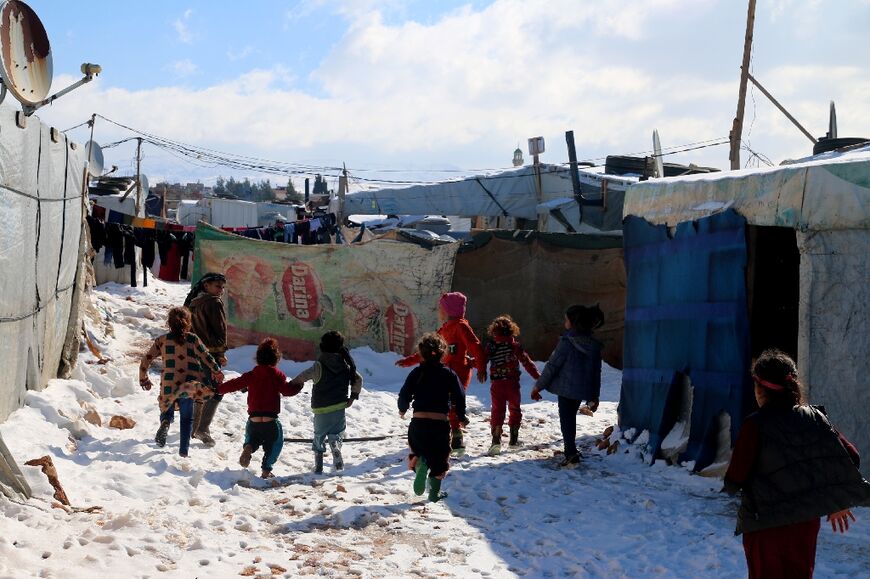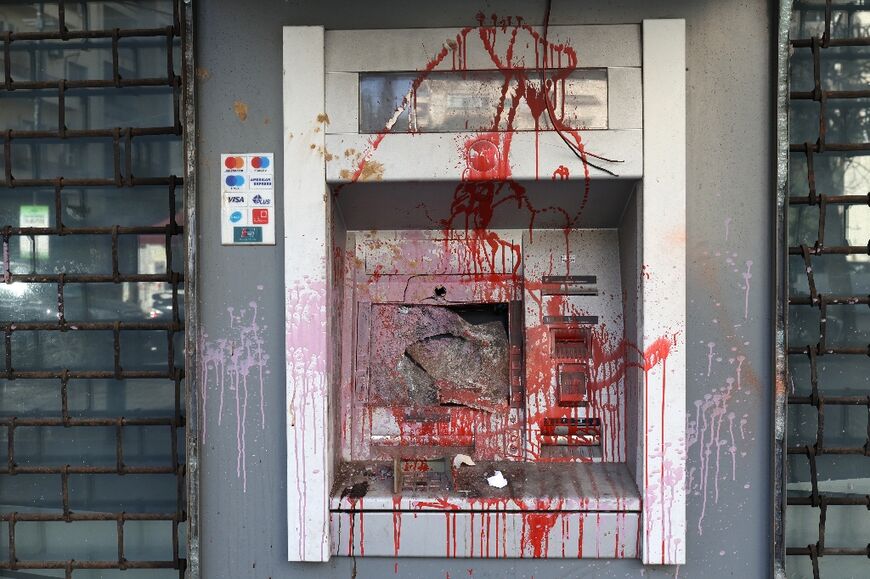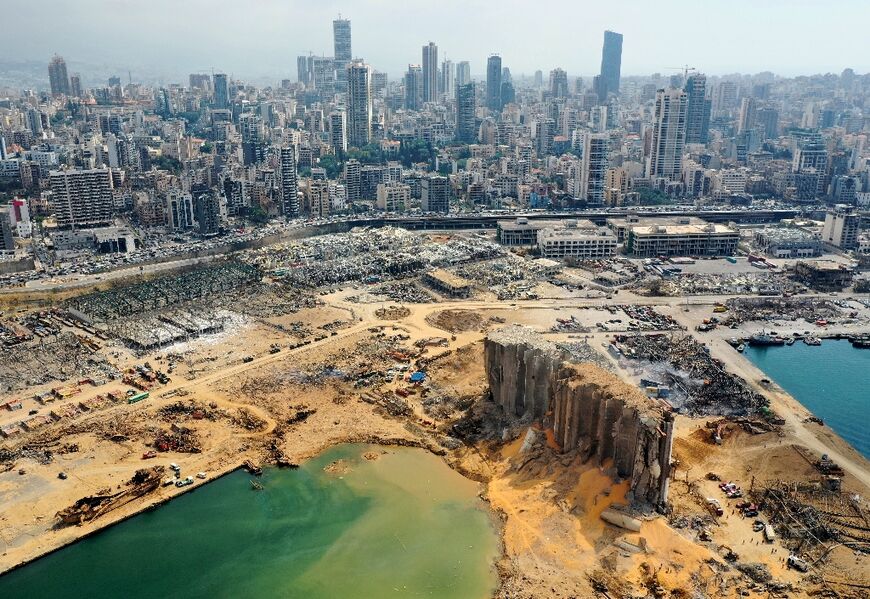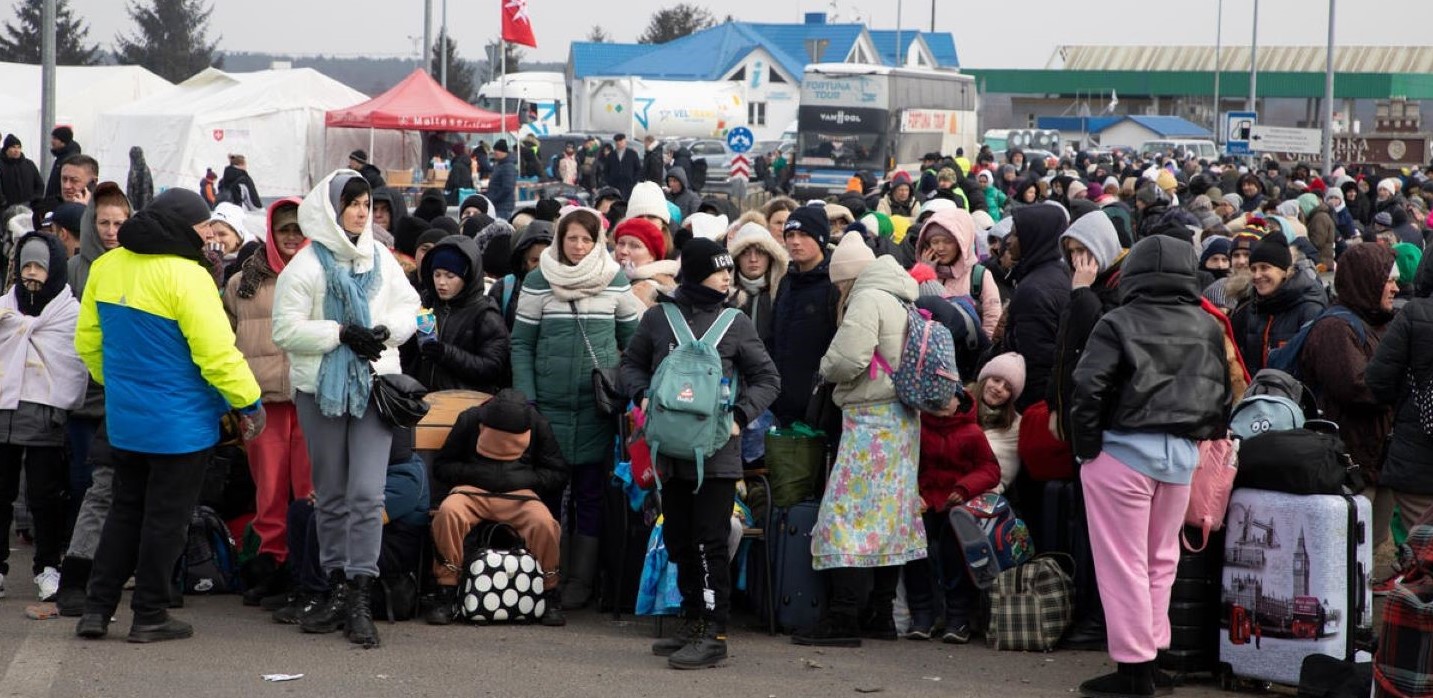Lebanon: The Sailing Shipwreck
The Lebanese people have persevered through endless hardships with an impenetrable dedication to their culture and community, but, with no light at the end of the tunnel, it is unclear how much more they can take.
The Lebanese people have persevered through endless hardships with an impenetrable dedication to their culture and community, but, with no light at the end of the tunnel, it is unclear how much more they can take.

The Lebanese people have proven their grit in the face of their attempted demise yet again. (AFP) - Photo Courtesy of BBC
by Inside Arabia | May 21, 2022
Picture a ship carrying a nation’s worth of passengers. A large boat sailing in the middle of an ocean of others, which suddenly starts taking significant blows. An incredible number of hits aggravate its condition until it’s wholly submerged. However, although underwater, the vessel has not yet sunk. It continues to slowly move forward, often stopping and never reaching the bottom –– all under the surface. Now think of Lebanon as that ship, with all its citizens aboard. And like this ship, Lebanon has taken on as much water as it can but refuses to sink to the seafloor. And like any item freefalling into the abyss of the deep blue, the bottom is out of sight.
How do you explain to a sailor from another ship that your captain has repeatedly attempted to throw you overboard? Or that your ship does not have permanent power or a freshwater source? Or that your captain has one day informed you that your life savings had just disappeared into thin air? Or that you survived the largest non-nuclear explosion coupled with a global pandemic and one of history’s worst-ever economic recessions, all at once? And that you protested for reforms, but were met with violence and oppression?
The Lebanese people are aboard a ship experiencing constant and imminent collision.
Our ship is unlike all other ships –– in the worst way possible. The Lebanese people are aboard what can only be described as a ship experiencing constant and imminent collision, extreme weather, damaged stability, engine breakdown, fire at sea –– and any other possible marine emergency you can imagine, orchestrated by a ruling class of warlords, bent on keeping a tight grasp of their captaincy.
Media outlets worldwide have, since early 2020, recorded dozens of headlines detailing the scuttling of our ship. Except we have not sunk, not yet, at least. A lawless vessel that continues to descend towards deeper waters piloted by commanders that refuse to abandon ship. Instead, they have turned into dead weight, planning on taking the ship and everyone down with them. So why has the ship not sunk?
This resistant force refusing to evacuate –– the only remaining fighting figure pulling away from the deepest depths of the sea –– is the very passengers. The Lebanese people have proven their grit in the face of their attempted demise yet again. For those in Lebanon, it is our hope-filled lungs that keep our ship from plummeting deeper. For the Lebanese diaspora, it is the lifelines that they continue to throw in an attempt to pull the ship back to the surface. The very essence of Lebanese society, culture, and identity is one of resilience, support, and togetherness –– an essence that lives on in the people all aboard this ship, flaring their hopes and dreams of a better Lebanon, like emergency beacons signaling rescue.
These beacons live among us –– they are us –– whenever able and often when unable too. This unparalleled desire to once again resurface has been passed on by generations –– by the people, for the people –– no matter how desperate and dire the situation. I was lucky enough to witness and experience some of the purest forms of the Lebanese culture in what can only be described as the most desperate time for the Lebanese in history. I share these narratives and personal accounts to depict a small part of the reality on the ground.
This unparalleled desire to once again resurface has been passed on by generations.
The purest embodiment of this notion of offering something you don’t have is Adib (uncle in Arabic). Adib is a homeless old man stationed under a bridge outside my place of work. I greet him daily and often ask if he needs anything, but I always receive his usual answer, “I cannot ask for more than your daily greeting.” A few months later and mid-Ramadan, I was staffing a later shift and would finish around iftar time. One night I was leaving just as the call for prayer signaled iftar, and I passed by Adib, only to find him still fasting. I informed him that the call for prayer had started and that he could break his fast. He answered, saying he had heard it but noticed I was finishing at this exact time and that he was waiting to share his donated meal with me. And he did so for the entire month of Ramadan. Every day, this man would wait for me to come down before he broke his fast, waiting to see if I wanted to share his donated meal with him. A man with nothing, sharing everything.
[Prospects for Real Change are Still Dim in Lebanon]
[Lebanon Crisis Leaves the Elderly Particularly Vulnerable]
Adib was not alone in giving something he didn’t have. Sometime during 2020, gasoline shortages hit on the eve of what I thought would be one of the most important meetings of my lifetime. I spent the night looking for a gas station to fill my car that was already running on fumes, but to no avail. The morning of, I left the house two hours before my meeting in search of gas. After an hour of franticly searching, I found an open station, but with a very long queue. Thirty minutes before my meeting, my turn finally came. As I approached with less than a kilometer left on the dashboard, the gas jockey lifted the gas pump nozzle, turned it upside down, and pulled the latch – nothing came out. The station had run out of gas –– I panicked.
Noticing my desperation, the gas jockey looked at me and asked me to turn my car on and follow him. We drove down the street and parked near a residential building. He asked me to get a screwdriver and an empty water bottle. He rushed up to the building and fetched what seemed to be a gallon of gas he had stored away in anticipation of a shortage. He sliced the bottle in half, put the screwdriver halfway into the bottle to clamp the valve open, and poured in the whole gallon. In disbelief, I started thanking him and reached inside the car for my wallet. When I had returned, he was already on his bike, driving off. I ran after him, requesting to pay him for the gas, but he didn’t stop and simply yelled back, “The people for the people. Pass on the blessing and help whoever comes your way.” I was speechless. There was no rhyme or reason for his generosity. I am sure there was someone who probably needed the gas more than I did.
“The people for the people. Pass on the blessing and help whoever comes your way.”
This very notion of the “people for the people” was most evident after the Beirut Port Explosion on August 4, 2020, when life in Lebanon ceased to exist for nine seconds. The very day after the blast tore through Beirut, Lebanon’s entire population, from all corners of the country, poured into Beirut. Armed with brooms, gloves, hammers, nails, and broken hearts, everyone came to the rescue of their fellow citizens. Streets filled with hundreds of thousands of volunteers –– cleaning, rebuilding, and supporting residents of the affected areas. A basecamp combining people of all backgrounds and expertise came into existence: organizing the distribution of supplies, documenting the damage, and allocating donated resources and construction teams to rebuilding homes –– all without the help or presence of the government. One particular house we helped stood out among others to this day. My friends and I were assigned to a top-floor apartment that had been completely torn apart and belonged to an old man who had barely escaped death. We spent over twelve hours cleaning and repairing all the damage. As we were finishing, the old man asked to show me an old picture. It was an image of him and his high school best friend –– someone he thought I shared a bizarre resemblance with. It took him a few minutes before he remembered his name, which quickly filled my eyes with tears. The old man was pictured standing beside my late grandfather back in high school. “He must have sent you to help me; he knew I would need you,” he said to me, crying his heart out.
There are too many stories that depict this unparalleled solidarity and commitment to our community, which has become the very identity of our culture. And this has been proven to be the case far outside and beyond Lebanon’s borders, just as recently as in the parliamentary elections. The Lebanese government played its dirty games to discourage people from voting by making the process more difficult, changing polling stations without notice, or locating them too far to reach. But we knew how important it was to vote them out, and the Lebanese diaspora was nothing short of incredible. People drove insane distances in multiple countries to get to the polling stations, stood in voting lines for hours under scorching heat, and flew to other cities to vote –– all to stop the corruption from gaining a tighter grasp.
We are part of something bigger –– for the first time in a long time.
We almost don’t have a choice. No one in Lebanon can do it alone. No one can survive. Perhaps the very reason we’ve been able to stay standing –– or more like crawling –– is because of how much we support each other. We are part of something bigger –– for the first time in a long time. And everyone knows it.
Perhaps sinking is necessary to rid ourselves of the ruling anchors dragging on the bottom of the seabed and start anew. Instead, we continue to adapt and grasp for more air or jump overboard to other ships and throw more lifelines. Adapt till when? Where and when is our breaking point? How much worse can it get? And how much more can we take? The Lebanese culture and identity have proven their expandability in depth and breadth, but are we really helping ourselves? Perhaps our culture’s very resilient aspect is also the enabler of our demise. How have we allowed ourselves to continue to take on so much, and why?
I am no expert to provide these answers. Still, when you live in a country where 78 percent of the population now lives under the poverty line, yet unattended bread crates delivered outside shops and restaurants go untouched or stolen, something does not add up. The reality is that the Lebanese identity –––the very essence of our culture –– cannot be killed. It cannot die. You can kill people, but you cannot kill an idea or an identity. It lives on, and it will live on. And it will continue to do so far after being supportive becomes a choice instead of a necessity. One day our ship will resurface – beaten, bruised, damaged, and destroyed –– but never sunk. Until then, “We are all for each other, and for [our] homeland” [كلنا لبعض و للوطن].




